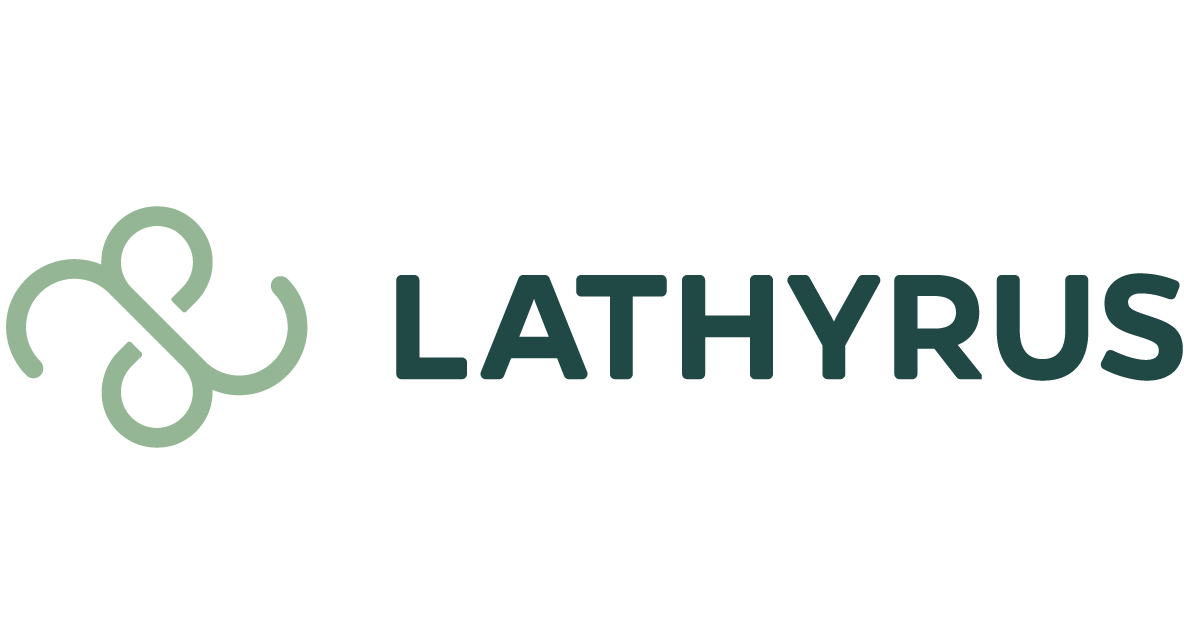I’m sitting in a backyard in Cambridge, Ontario, looking over the millpond on Speed River, watching the water’s cold, viscous swirls. As I sit, I listen to the low tones of a large pentatonic chime suspended to my left, stirred by a crisp, steady breeze. Its aleatoric Gregorian music is punctuated by a cardinal sitting in a bare-branched tree across the wood fence on my right: Tweet! Tweet! Tweet! Tweet! Tweet! followed by three quick, high whistles, and ending with a growly “Rrrrrrrr”. A more distant cardinal repeatedly answers with three quick, high whistles followed by two low coos.
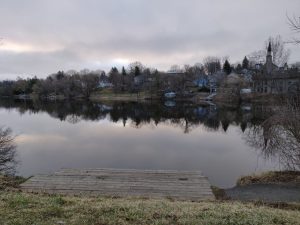
Millpond on Speed River
Sitting here in the sunny, cold Ontario spring, warmly bundled, feels particularly precious since it’s one of very few hours that I can be outdoors while I’m in quarantine. I’m savouring the scents in the air; the gentle cadence of my breath; the feeling of blood, in response to the cold, rising in my cheeks and retreating from my toes and fingers; the liveliness of my body, even in apparent stillness.
When I left my job and home to spend a year in Malawi, I had no expectation of coming back to those when I returned. I knew that after the year ended, I would be living somewhere different, doing different work. I expected disruption: That was part of the plan. What I couldn’t have anticipated is the degree of that disruption, or that it would envelope the entire world.
I”m reminded of a quote from Ursula K. Le Guin’s book The Dispossessed“ that I transcribed several months ago: “‘You can go home again, the General Temporal Theory asserts, so long as you understand that home is a place where you have never been.’”
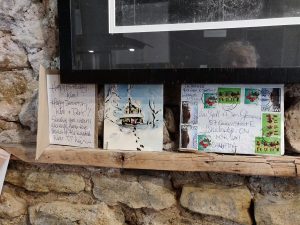
Heart-warming: Mail from Malawi on display
Certainly, I would never have dreamed that I would find myself at “home” here in Cambridge, Ontario, being generously hosted by my sister-in-law Kim and her husband Don. In many, many ways, it seems like the best place I could possibly have landed on my return.
Meditating on the river, the chimes, the birds, is as much a respite for my mind as sitting outdoors is for my body. Back inside my bedroom, the simple question to which I keep returning is, “What now?”
This is a very different question from the one I am repeatedly, more than daily, hearing and reading, which is, “When will things go back to normal?” On one of many video conference calls, a woman in Shanghai, where people are once again free to leave their homes and return to work, talks about how surprised she is to see just that. “The streets are busy, people are going to work and shopping for Gucci again,” she says, “as if it never happened.”
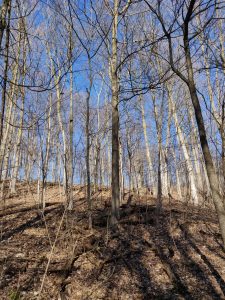
That scares me. As human beings, we’re very good at denial, at certain cognitive distortions. As we’ve just proven globally, we’re pretty lousy at preparing for or preventing low-frequency, high-risk events, even with many advance warnings. And, despite our claim to be a species of extraordinary intelligence, we can also be pretty lousy at learning from our mistakes. What’s normal to us, whether it’s good or bad, feels familiar, provides some comfort; and after weeks and months of disruption, comfort is what many of us are seeking.
Over and over again, I hear and read people’s fears and predictions about the effects of COVID-19 on the economy, their questions about when markets will be able to return to normal, how slowly or quickly we’ll be able to resume economic growth.
Economic growth? Have we already forgotten that we are rapidly propelling our entire planet toward a climate disaster? That wealthy nations are already consuming more than the Earth can support? Is it lost on us that our efforts to flatten the curve for COVID-19 has — incredibly, given the paucity of our previous efforts — been somewhat flattening the curve of greenhouse gas emissions, a curve that has been rapidly spiking over the red line?

A few days after I arrive at Kim and Don’s, I pick up my ukulele again and play a few old favourites: “Side by Side”, “Oh, Susannah”, “Shortenin’ Bread”. I’m shocked by how differently I hear them. “Three little children lying in bed, two were sick and the other most dead.” “Don’t know what’s coming tomorrow. Maybe it’s trouble and sorrow, but we’ll travel our road, sharing our load, side by side.”
These songs remind me that as human beings, we’ve been through very tough times before. In fact, although those of us under 80 have no memory of anything else, 1950 to 2019 was an exceptional time in human history. The eldest among us, and the generations before them, lived very differently. The vast majority of people on this planet still do. The way that the wealthy (myself and pretty much anyone able to read this blog online) have been living, when viewed from a wider lens, has most definitely not been the norm.
So maybe it is time to for us, in many respects, to return to normal ― the normal that we’ve never known. A normal that requires us to travel little, and more slowly; to consume much less, and live more simply than we have been for the past seventy years.
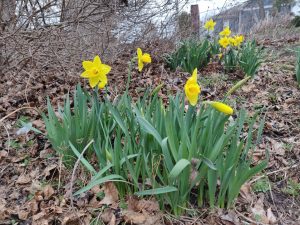
I may be quarantined, but there are more than enough things to fill my days: emails, video conferences, and phone calls with friends and family; online meetings and seminars; applying for a coaching contract; updating my website; organizing my things so that I can live and work in this room. Once quarantine is complete and I know I’ll be staying here for a few months, I need to arrange for medical insurance, get a new SIM card and phone number, stock up on groceries, help around the house, fix a borrowed bicycle, learn how to get around.
How do I make the most of these few weeks? There are always things to do, but I also very much need time for not doing, for reflection. What do I learn from this? How do I make what happens next in my life meaningful? What is my contribution? How do I want — and how do I need — to change?
Some things are clear: I’ve taken my last non-essential carbon-fuelled airplane flight. I feel sadness about that, knowing I may never again visit Hawai’i, Europe, or Africa; never experience Thailand, New Zealand, India, or Viet Nam.
But what is that small sadness compared to the beauty of life on Earth?
The river flows and swirls. A small bundle of bright red in the bare branches gives three quick, high whistles, then two low coos amid the pentatonic ring of chimes.
Copyright © 2020 Lynn Thorsell, All rights reserved.
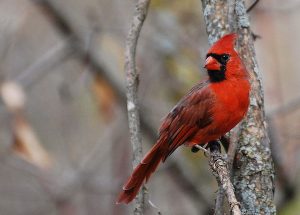
Tattooeddreamer / CC BY-SA (https://creativecommons.org/licenses/by-sa/3.0)
~ * ~ * ~
References
Heffernan, Margaret. Willful Blindness: Why we ignore the obvious at our peril. Bloomsbury, New York, 2011. Watch Margaret’s TED Talk
Kagge, Erling. Walking is our only respite. Macleans, April 10, 2020
Rees, William. We must rethink growth society. The Tyee, April 6, 2020.
~ * ~ * ~ * ~


